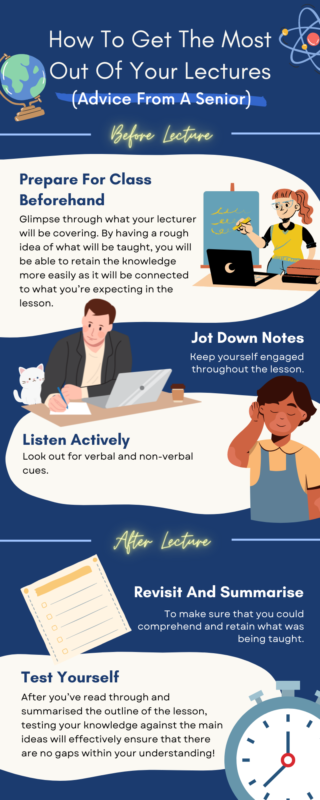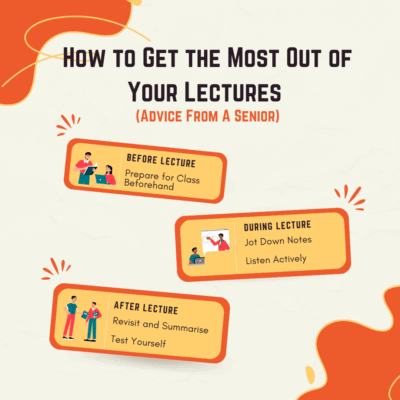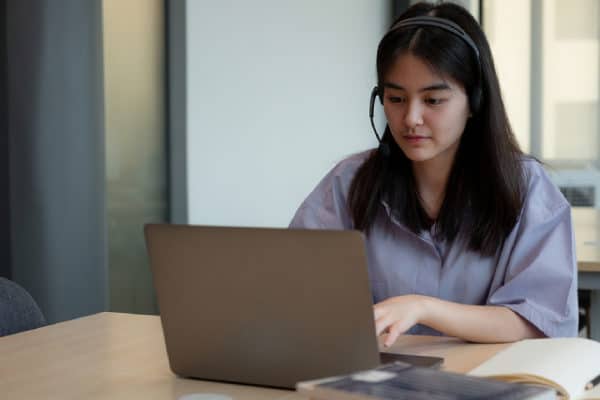We all know that lectures can be very draining. I remember back when I was first introduced to lecture-based teachings in Junior College, I found it quite difficult to exercise self-discipline and stay attentive during lectures, as it was a big transition from the small class size that I was accustomed to in secondary school.
Nonetheless, as lectures are a common way of teaching at a tertiary level, it is critical for us to get used to this method of learning. In order to maximise your learning, listening attentively during lectures is simply not enough; there is a need to make a conscious effort to prepare beforehand and revisit what was taught to retain your knowledge. With that being said, here are some helpful strategies I (try to) adopt to learn the most effectively from my lectures!
Before Lecture
1. Prepare for Class Beforehand
Recently, as I reflected on my time in JC, I believe that one of the main reasons I struggled with the workload was attributed to the fact that I was unprepared for many of my classes. This was worsened with the COVID disruptions as my lectures were conducted through Zoom, where the lack of face-to-face interactions made the learning process even more impersonal and isolating. However, since we’re transitioning towards the new norm of blended learning, the need to exercise self-discipline in preparing for lectures becomes ever so pertinent.
If you’re like me, and you’re concerned with the amount of time doing preparation would take, a good start would be to glimpse through what your lecturer will be covering. By having a rough idea of what will be taught, you will be able to retain the knowledge more easily as it will be connected to what you’re expecting in the lesson, which can help you identify the key points later on! Another good habit to cultivate would be to take 5 to 10 minutes to review the past lecture to see where you left off, as it sets a foundation to what you’ll be covering.

During Lecture
2. Jot Down Notes
By writing down the key points during lectures, not only are you doing yourself a favour by penning down critical information that may not be included in your notes, but also keeping yourself engaged throughout the lesson. For me, I always had a post-it pad on standby in case I needed any additional space to do any note-taking as I felt that the act of writing worked best in retaining the information learnt.
3. Listen Actively
Look out for verbal and non-verbal cues! Such cues can take the form of…
| Verbal Cues | Non-Verbal Cues |
| A prompt that is conveyed in spoken language from one person to another or a group of people. Examples: – use of superlatives (“best”, “most”, “least”) – repetition of certain words and phrases – change in volume | Signals that people use to communicate with one another without language. Examples: – hand gestures – highlighting and underlining of key ideas |
After Lecture
4. Revisit and Summarise
Many students (myself included) tend to overlook the significance of reviewing what was taught after the class has ended. Nevertheless, revising after every lecture is of utmost importance should you want to make sure that you could comprehend and retain what was being taught. After the lecture, briefly look through what you have written down alongside your notes, and see if there are any gaps in your understanding. If there are any, pen down the questions to look out for in the next lecture or seek help from your tutor.
Additionally, I found that writing a short summary on what was gone through was extremely helpful in my revision. Usually, after any lecture, I would just spend 1 to 2 minutes to write in point form the gist of the content taught to ensure that I caught all the main concepts!
5. Test Yourself
Numerous studies have shown that self-questioning is a very effective way of learning as it forces us to evaluate and dig deeper into what is being taught. By being more involved in the learning process, research has proven that students tend to have a longer retention of knowledge and skills, allowing us to think more critically.
This strategy of self-question should be used in conjunction with the strategy of summarising (as stated above). After you’ve read through and summarised the outline of the lesson, testing your knowledge against the main ideas will effectively ensure that there are no gaps within your understanding!

Conclusion
With that being said, I hope you have gained some key takeaways from this blog! As a student myself, I understand it’s not easy to practise these strategies all at once as I struggle with it too, but I think that it’s important that we all do our best to slowly cultivate these habits to maximise what we can learn from school! All the best 🙂





